Negotiations with Mayor Parker persist, with the offer of holiday pay incentive on the table to bring an end to the ongoing strike.
The ongoing strike by around 9,000 municipal workers in Philadelphia, led by the American Federation of State, County and Municipal Employees District Council 33 (AFSCME DC33), is now in its fourth day. The dispute, which involves sanitation workers, emergency services, library staff, and more, has resulted in significant service disruptions and growing public frustration [1][2][5].
The workers are demanding a minimum of 8% annual wage increases, citing poverty pay and the high cost of living in Philadelphia. In response, the city had proposed raises of 2.75%, 3%, and 3% over three years, plus a 2% bonus, but the union insists on a 5% annual raise for four years [2]. Despite numerous meetings, negotiations have made no progress, and the union leadership has indicated no plans to resume negotiations immediately, especially around the July 4 holiday [2][3].
Mayor Cherelle Parker has publicly stated that the city cannot negotiate with itself and noted the challenges the strike poses to the city while events, including the 4th of July celebrations, continue [2][3]. The city's four-year deal, part of a five-year plan, would cost $115 million from the city budget [6]. However, Parker states she can't offer more than a 13% raise over her four-year term due to budget constraints for other unions [7].
The strike, Philadelphia's largest in decades, has garnered widespread public support, with the union emphasizing that wages have stagnated while living costs, like rent, have skyrocketed, making the current pay insufficient for a living wage [1]. The union denies all claims of vandalism and harassment during the strike [8].
In response to the strike, the city has used courts to require 911 call center workers to return to their jobs, prohibit workers from blocking trash dump entrances or harassing city staff, and take other measures [8]. The union is unsure if it will meet tonight to counter the city's proposal and negotiate further [9].
In a bid to end the strike before the Fourth of July holiday, the Parker administration is offering special dedicated access to all home affordability programs spearheaded by the mayor, as well as proposing dedicated low-interest 30-year home mortgages for DC33 union members as part of their contract deal [10].
Despite the ongoing strike, Mayor Parker is urging visitors not to cancel their plans to visit Philadelphia for the Fourth of July [11]. The city is facing a growing mountain of trash due to the strike, and emergency and library services have been reduced [1][2][5]. A judge has issued a court order requiring medical examiner's office workers to return to their jobs by 3 p.m. Thursday due to piling up dead bodies and remains that need to be returned to families [4].
The situation remains dynamic, with no announced date for further talks or resolution. The union's Greg Boulware states that union members were directing traffic and managing trash at sanitation centers, not causing trouble [8]. Parker states that union members can earn double time if they leave the picket line and return to work during a federal holiday [12]. The union is yet to respond to the city's latest proposals and the offer of home mortgages.
The ongoing strike, a significant event in Philadelphia's politics, has led to a stalemate in policy-and-legislation discussions between the city and union representatives, specifically regarding wage increases for municipal workers. The union's insistence on a 5% annual raise for four years, in contrast to the city's proposed 3% raises over three years, has resulted in a deadlock, causing disruptions in general-news such as sanitation, emergency services, and library operations.




